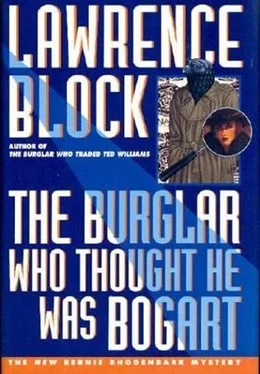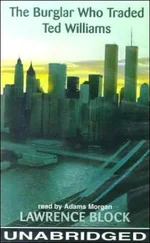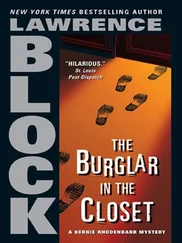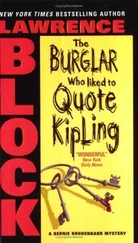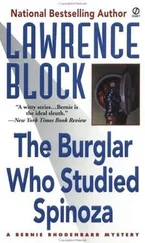“I can believe it.”
“Yeah? I didn’t know better, I’d think that was a crack. I’ll tell you this much, Bernie. It’s a good thing for you your name ain’t Kay Fobb.”
“Well, it’s not,” I said, “and it never has been. What are you talking about?”
“Kay Fobb. Ring a bell?”
“Not even a tinkle. Who is she?”
“You figure it’s a woman? I don’t even know if I’m sayin’ it right, Bernie. Here-whyn’tcha take a squint at it yourself an’ tell me what you make of it.”
He flipped the case over and showed it to me. There, in block capitals of a rusty brown that stood out sharply against the beige Ultrasuede attaché case, someone had printed CAPHOB.
In Dead End, Bogart plays Baby Face Martin, a gangster making a sentimental visit to his boyhood home on the Lower East Side. By the time it’s over, he’s been slapped by his mother, Marjorie Main, and shot dead on a fire escape by Joel McCrea. There were a lot of other good people in the movie, including Claire Trevor and Sylvia Sidney and Ward Bond, along with Huntz Hall and Leo Gorcey, who had evidently wandered over from the Bowery. Lillian Hellman wrote the screenplay and William Wyler directed, but my favorite credit was costumes, by someone named Omar Kiam.
During Bogie’s death scene, Ilona reached over and took my hand.
She held it through to the end of the picture, and when she came back from the ladies’ room at intermission she reached to take my hand in both of hers. “Bear-naaard,” she said.
“Ilona.”
“I was afraid you would not be here tonight. All day I was afraid.”
“What made you think that?”
“I don’t know. When I rode off in the taxi last night fear clutched at my heart. I thought, ‘I will never see him again.’”
“Well, here I am.”
“I am so glad, Bear-naard.”
I gave her hand a squeeze.
The second feature was The Left Hand of God, one of Bogart’s last films. He plays an American pilot in China during the war, working for Lee J. Cobb, who’s a Chinese warlord. Cobb’s men kill a priest, and Bogart winds up escaping in the dead priest’s clothing and holing up at a mission, where he poses as the priest’s replacement, reminding me a little of Edward G. Robinson in Brother Orchid.
It all works out in the end.
Across the street, we sipped cappuccino and split an eclair. After a long silence she said, “I was so worried, Bear-naard.”
“Were you? I knew he and the nurse were going to wind up together. I thought he might have to kill Lee J. Cobb, but that was a nice touch, having them throw dice.”
“I am not talking about the film.”
“Oh.”
“I thought I had lost you. I thought you were on your way to another woman.”
“Didn’t I tell you it was a business appointment?”
“But you would say that, no? Even if it were not so.” She looked down at her hands. “I would understand if you were with another woman. I have been…distant. But I have had so much on my mind these past weeks. The only time I feel alive is when we are in the movies together. The rest of the time I can barely breathe.”
“What’s the matter, Ilona?”
She shook her head. “I can’t talk about it.”
“Sure you can.”
“Not now. Another time.” She sipped her cappuccino. “Tell me about your business appointment. Or is it a confidential matter?”
“Someone had a library for me to look at,” I said. “I usually do that sort of thing in the early evening, but we’ve been at the movies every night. I thought I would be safe scheduling it for late last night.”
“Because I have been hard to get, yes?”
“Well…”
“You have another library to look at tonight, Bear-naard?”
“No.”
“I have a few books. I do not think they are valuable, but maybe you can come and see them.” She extended her forefinger, ran it along my jawline, then touched it to my lips. “But perhaps you have another business appointment, and I will have to go home all by myself.”
It turned out she lived on Twenty-fifth Street between Second and Third avenues, in a fifth-floor walk-up over a shop called Simple Pleasures. They sold crystals and incense and tarot cards, and signs in the window advertised classes in witchcraft and bondage.
The stairs were steep, and there were lots of them. I could imagine what Captain Hoberman would have made of them.
She lived in one of the two rear apartments, just one room with a single window that looked across an airshaft to the blank wall of a much taller building on Twenty-sixth Street. She turned on the bare-bulb ceiling fixture, then switched it off as soon as she’d turned on a green-shaded brass student lamp on the little one-drawer desk, then turned that off after she’d lit the three candles that stood on top of an old-fashioned brass-bound footlocker in the far corner. The flames of the candles illuminated the artifacts of a little homemade shrine. There were photos, framed and unframed, an icon of a Madonna and child, another of a bearded sunken-eyed saint, and a collection of other small objects, including a quartz crystal that could have come from the shop downstairs.
Otherwise the apartment didn’t have much to make it hers. A pair of plastic milk cartons housed her books, and a bound broadloom remnant, stained and worn, covered about half of a floor that badly needed refinishing. The bed and dresser looked to have come with the apartment, or from a thrift shop. The walls were bare except for a Birds of the World calendar hanging from a nail and, Scotch-taped to the wall above the desk, a National Geographic map of Eastern Europe. It was impossible to make out much in the candlelight, but it would have been hard to miss the small jagged area outlined in red Magic Marker.
“This must be Anatruria,” I said.
She moved to stand beside me. “My country,” she said, her voice heavy with irony. “The center of the universe.”
“You’re wrong,” I said. “This is the center of the universe.”
“ New York?”
“This room.”
“You are so romantic.”
“You are so beautiful.”
“Oh, Bear-naard…”
And there, if you don’t mind, I’m going to be old-fashioned enough to draw a curtain. We embraced and disrobed and went to bed, but you’ll have to imagine the details for yourself. We didn’t do anything you couldn’t see on television, anyway, if you’ve got cable and stay up late enough.
“Bear-naard? Sometimes I smoke after I make love.”
“I can believe it,” I said. “Oh. You mean a cigarette.”
“Yes. Would it bother you?”
“No, of course not.”
“My cigarettes are in the drawer of the night table. Could you reach them for me?”
I passed her a half-full pack of short unfiltered Camels. She put one in her mouth and let me scratch a match and light it for her. She sucked in the smoke as if it were life-sustaining, then pursed her lips and blew it out like Bacall showing Bogart how to whistle.
“Of course a cigarette,” she said suddenly. “What else would I smoke? A herring?”
“Hardly that,” I agreed.
“It is to lessen the sadness,” she said. “Shall I tell you something? I wanted to make love with you the first night, Bear-naard. But I knew it would make me sad.”
“I guess I must not be very good at it.”
“But how can you say that? You are a wonderful lover. That is why you break my heart.”
“I don’t understand.”
“Look at me, Bear-naard.”
“You’re crying.”
I reached to wipe a tear from the corner of her eye. A fresh one promptly took its place.
“It is no use to wipe them away,” she said. “There are always more.” She took another deep drag on her cigarette. When she smoked, she really smoked. “It is the way I am,” she explained. “Lovemaking saddens me. The better it is, the worse I feel.”
Читать дальше
